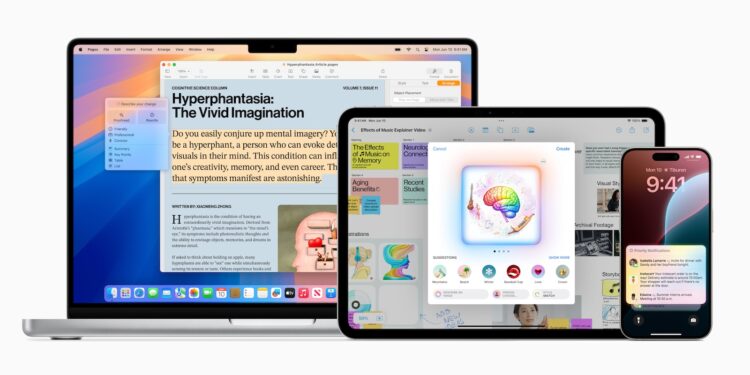With the launch of iOS 18, iPadOS 18, and macOS Sequoia, Apple is taking the user experience to a new level. The latest innovation, called Apple Intelligence, uses generative AI models directly on devices to enable personalized and enhanced interaction. But these revolutionary features are only available on the latest Apple devices, such as the iPhone 15 Pro, iPhone 15 Pro Max, and Macs and iPads with M1 or later chips. Find out why Apple has drawn this line and what benefits Apple Intelligence offers below.
Since the announcement of Apple Intelligence at WWDC 2024, many users have asked questions about hardware compatibility and the reasons behind it. Why do these new AI features require the latest devices? talk show “Live From WWDC 2024,” senior Apple employees including John Giannandrea, Greg Joswiak, and Craig Federighi provided detailed insights. Read on to find out everything you need to know.
Why Apple Intelligence only works on the latest devices
Performance Requirements for Inference of Large Language Models
John Giannandrea, head of artificial intelligence and machine learning at Apple, explained that inferring large language models, i.e. executing them at runtime, is extremely computationally intensive. This requires high device bandwidth, a powerful Apple Neural Engine and sufficient system performance. Older devices could theoretically also run such models, but would be so slow that it would be impractical to use.
iPhone 15 Pro hardware specifications
The iPhone 15 Pro and iPhone 15 Pro Max feature the A17 Pro chip, which includes a 16-core neural engine. This is up to two times faster than the A16 chip in the iPhone 15 and iPhone 15 Plus and can perform nearly 35 trillion operations per second. Craig Federighi also mentioned that memory (RAM) plays an important role - devices with Apple Intelligence require at least 8 GB of RAM.
Not a sales strategy but a technological necessity
Greg Joswiak stressed that the decision to only support Apple Intelligence on newer devices is not due to sales strategies. If that were the case, Apple would have limited the feature to the latest iPads and Macs as well. Instead, it's about providing the best possible user experience, which is only possible with the latest hardware.
Benefits of Apple Intelligence
Apple Intelligence offers numerous benefits that take the user experience to a new level:
- Personalized AI experiences: By using generative models directly on the device, you get personalized suggestions and features tailored to your needs.
- Greater efficiency and speed: Thanks to the powerful Neural Engine, AI-supported applications run faster and more efficiently.
- Data protection: Since the models run directly on the device, your data remains safe and private.
Future developments and compatibility
Even though older iPhones don't support Apple Intelligence, iOS 18 offers other exciting features. Any iPhone that supports iOS 17 will also get iOS 18, including the iPhone XR from 2018. If you still want to use Apple Intelligence, you can wait for the release of the iPhone 16 series, which is expected to be released in the fall.
Optimal performance thanks to the latest hardware
Apple Intelligence marks a significant step in the evolution of the user experience by integrating advanced AI models directly on the device. However, this innovation requires the latest hardware to ensure high processing power and efficiency. While users of older devices can continue to benefit from the improvements in iOS 18, the latest iPhones and Macs provide the optimal platform for Apple Intelligence. Looking to the future, Apple remains true to its goal of improving users' everyday lives through technological advances. (Image: Apple)
- Apple Intelligence sets new standards in data protection
- iOS 18: Labeling AI images with Image Playground
- Unique Emoji with iOS 18: How Genmoji works





